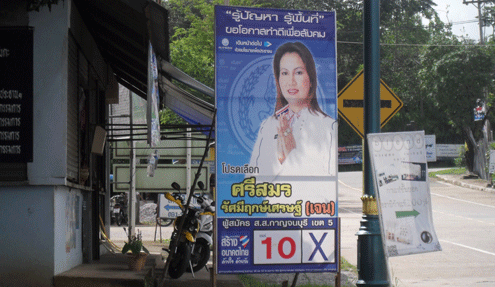By Lyi Htaw, Independent Mon News Agency – Ethnic Mon voters are excited. For the first time being recognized as Thai citizens, they have the chance to elect representatives in the national parliament during the upcoming July 3rd general elections in Thailand.
 “I will vote for the party candidate that I think will work for the people’s benefits. I think, that the party I am voting for will get 80% of the votes in this area,”said a 40-year-old female voter, Mi Shin. But she refused to mention who she will vote for.
“I will vote for the party candidate that I think will work for the people’s benefits. I think, that the party I am voting for will get 80% of the votes in this area,”said a 40-year-old female voter, Mi Shin. But she refused to mention who she will vote for.
In Kanchanaburi Province of Thailand, there are three main Thai political parties, the current ruling government’s Democrat Party, the opposition, Pheu Thai Party, and Phoom Jai Thai party are contesting to win for a seat in the national parliament.
After the unstable political situation and serial flood disasters in the southern part of Thailand, the country is facing a declining economic situation and people have found commodity and fuel prices to be expensive.
Some Mon voters said they will need a government and leadership who can pace a way for national reconciliation and improve the economic situation.
“For me, I need a good government. The government must take care of the welfare of the people and help the poor. I will find out which party is focused on that and will vote for them,”said a female voter, Mi Dee Aye. She still has not decided on which party she will vote for.
Mon voters in the area understand that voting is confidential, so they did not identify who they will vote for. However, two main parties, the Democrat Party and the Pheu Thai Party’s candidates are competing against each other quite noticeably. Some said they like the candidates from Democrat Party as they are familiar with these candidate while some said they will vote for Pheu Thai Party because they believe that this party can improve the economic situation.
Thailand has held a democratic political system for over 60 years, under the patronage of the Royal Thai King, and the current constitution provides that Thailand must hold elections every four years.
500 people’s representatives will be elected to parliament. The voters need to elect 375 representatives from 375 constituencies and the remaining 125 representatives are elected from party lists of political parties based on the number of votes in the elections. Thailand’s election uses both a ‘direct representative voting’ system and a ‘proportional voting’ system.



